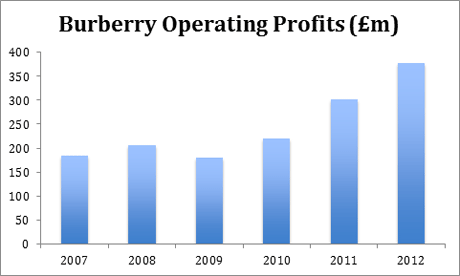With Burberry you get what you pay for
British fashion label Burberry is having no problems selling to the style-conscious abroad. So, should you buy shares in the iconic brand? Phil Oakley investigates.
Get the latest financial news, insights and expert analysis from our award-winning MoneyWeek team, to help you understand what really matters when it comes to your finances.
You are now subscribed
Your newsletter sign-up was successful
Want to add more newsletters?

Twice daily
MoneyWeek
Get the latest financial news, insights and expert analysis from our award-winning MoneyWeek team, to help you understand what really matters when it comes to your finances.

Four times a week
Look After My Bills
Sign up to our free money-saving newsletter, filled with the latest news and expert advice to help you find the best tips and deals for managing your bills. Start saving today!
Lots of Britain's well-known retailers such as Tesco and Marks and Spencer are struggling. Some such as Clinton Cards have gone out of business altogether. So are there any retailing success stories out there?
Enter Burberry. Once part of Great Universal Stores (which also contained Argos) with its hallmark trench coats and famous checks, the company has capitalised on the growing demand of those with money to wear iconic, branded British goods.
And it seems that the growing numbers of wealthy Asian consumers can't get enough of them. Since a soft patch during the financial crisis of 2008/09, Burberry's profits have doubled. It now has a stock market valuation of £5.9bn. To put this in perspective, Marks & Spencer is valued at £5.4bn.
MoneyWeek
Subscribe to MoneyWeek today and get your first six magazine issues absolutely FREE

Sign up to Money Morning
Don't miss the latest investment and personal finances news, market analysis, plus money-saving tips with our free twice-daily newsletter
Don't miss the latest investment and personal finances news, market analysis, plus money-saving tips with our free twice-daily newsletter
It's probably not fair to compare M&S with Burberry. Cash-strapped British shoppers weigh down the former, whilst Burberry is selling to lots of people who have plenty of money in countries that are getting richer. The point is that Burberry seems to have a growing market of customers who want to buy what it sells.

That's all well and good, but Burberry's shares have rocketed along with its profits during the last three years. At 1,350p, the shares like its merchandise are not cheap, trading at 18.6 times 2013 forecast earnings. But does that mean that you should stay clear?
Is Burberry a buy?
Not so long ago I would have answered, "yes" to this question. But now I'm not so sure. Like lots of things in life, you get what you pay for. It is very difficult to pick up good companies at cheap valuations. Those that look cheap usually have a good reason for being so. In a recent edition of MoneyWeek magazine, I explained how buying good companies and holding them for the long-term has proven to be a good strategy.
So where does that leave Burberry? I'm not saying that the shares are a 'buy' at any price, but it is clearly doing something right. If it can keep growing its profits, then buying the shares at the current price may not be a bad thing to do. Granted, if you think the world economy is about to take a downward turn, then you'll stay clear of most shares.
But it looks as if Burberry can keep growing for a good while yet. Its retail business is firing on all cylinders (comparable store sales were up 14% during the last year). During the next year, it will increase its selling space by 12-14% with 15 large-format stores in prominent shopping cities such as London, Chicago and Hong Kong.
However, it is the growing affluent emerging-market consumers of places such as China, Brazil and Central and Latin America that offer more opportunities for growth. Of course, the fortunes of their respective economies will decide whether this happens or not. If it does, then who's to say that Burberry won't develop into a major global luxury brand business?
Despite adding lots more selling space, Burberry expects to maintain its high retail profit margins. When you then consider its highly profitable licensing business (perfumes, watches and eyewear), Burberry's profit margins should still exceed 20% - a level that most retail businesses can only dream of.
Its finances are also in very good shape with net cash of £338 million. Fixed-charge cover (the ability to pay rents and interest bills) is a comfortable three times.
Burberry's products may not be to everyone's taste or budget but its shares deserve a place on most investors' watch list.
Get the latest financial news, insights and expert analysis from our award-winning MoneyWeek team, to help you understand what really matters when it comes to your finances.
Phil spent 13 years as an investment analyst for both stockbroking and fund management companies.
-
 Can mining stocks deliver golden gains?
Can mining stocks deliver golden gains?With gold and silver prices having outperformed the stock markets last year, mining stocks can be an effective, if volatile, means of gaining exposure
-
 8 ways the ‘sandwich generation’ can protect wealth
8 ways the ‘sandwich generation’ can protect wealthPeople squeezed between caring for ageing parents and adult children or younger grandchildren – known as the ‘sandwich generation’ – are at risk of neglecting their own financial planning. Here’s how to protect yourself and your loved ones’ wealth.